China's wisdom to drive global modernization
https://www.globaltimes.cn/page/202210/1277437.shtml
International pundits hail CPC's role for world peace, growth
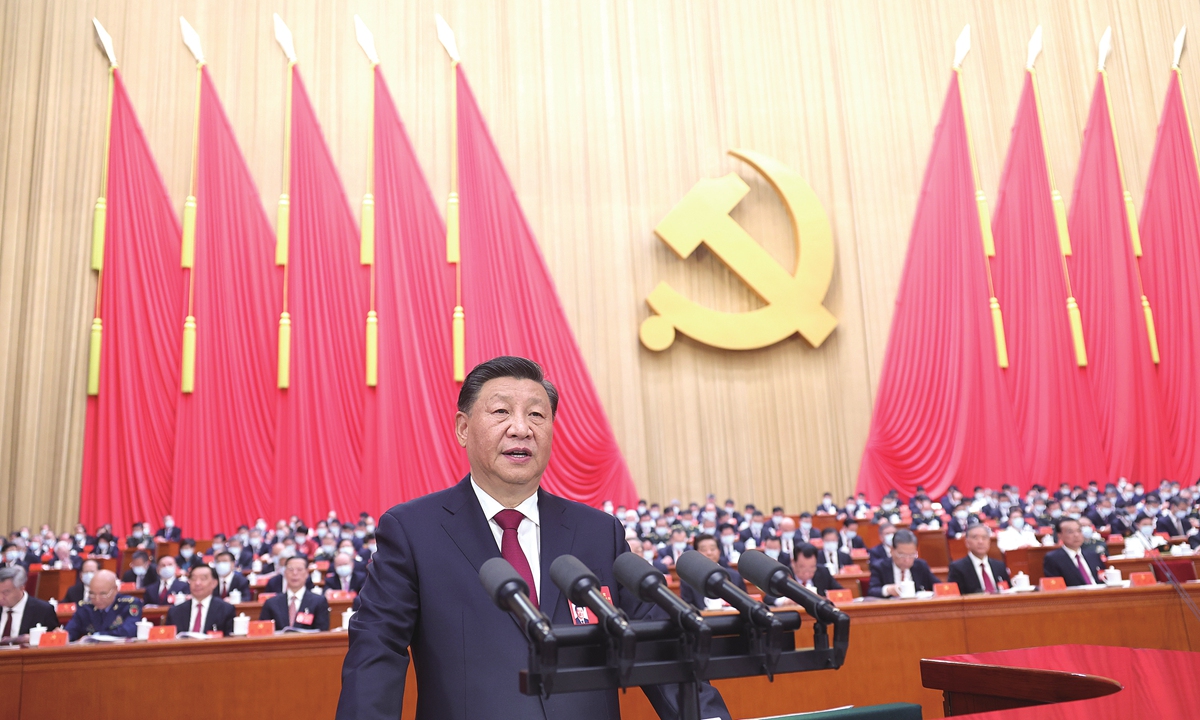
Xi Jinping delivers a report to the 20th National Congress of the Communist Party of China (CPC) on behalf of the 19th CPC Central Committee in Beijing on October 16, 2022. The 20th CPC National Congress opened on the day. Photo: Xinhua
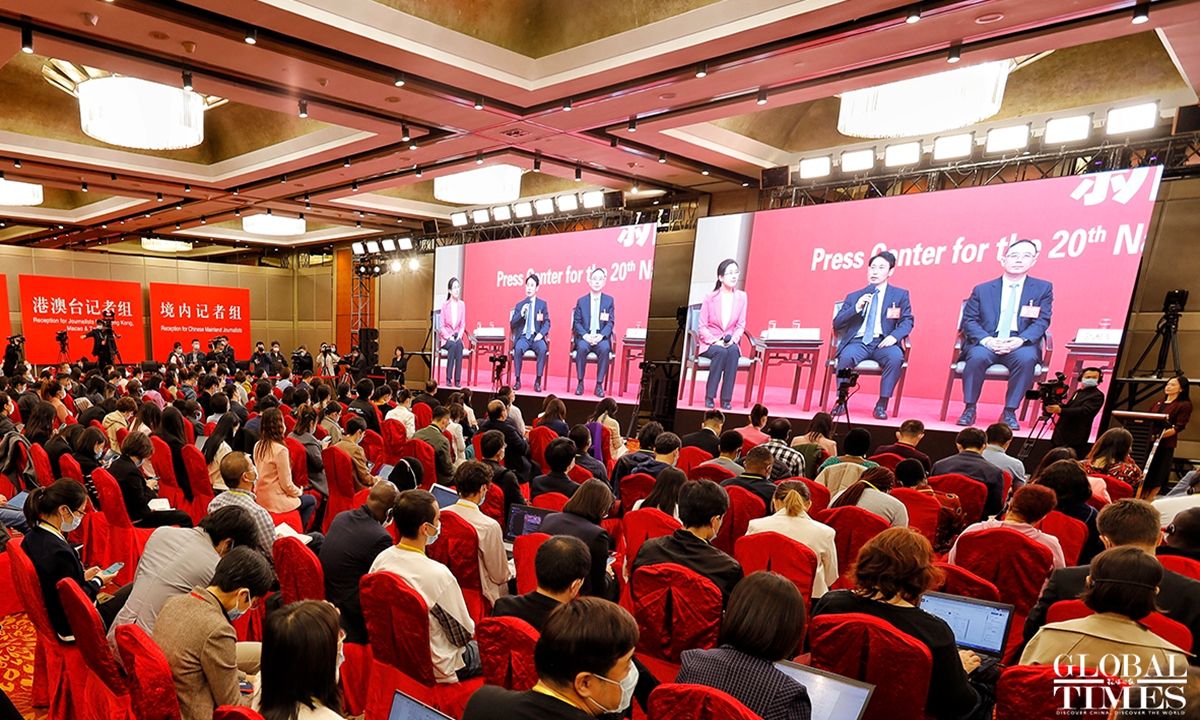
Editor's Note:
The 20th National Congress of the Communist Party of China (CPC) opened on October 16. During the opening session, Xi Jinping, said that Chinese modernization is the socialist modernization pursued under the leadership of the CPC. He unveiled China's main objectives and tasks for the next five years as well as overall development objectives for the year 2035.
On China's foreign policy, Xi said China opposes all forms of unilateralism and the forming of blocs and exclusive groups targeted against particular countries. China is firm in safeguarding the international system with the United Nations (UN) at its core, the international order underpinned by international law, and the basic norms governing international relations based on the purposes and principles of the UN Charter.
Observers said that China's modernization as well as Chinese answers to global challenges is of significance to the development and peace of the world, as the Chinese path to modernization inspires other developing nations to seek their own development paths. China has become a pioneer and builder of world peace and a driving force in shaping a more just and effective global governance through its peaceful rise, the observers added.
This is the fourth installment of the Global Times' special coverage of the special event. Here are the first, second and third installments.
The world is keenly watching the 20th National Congress of the Communist Party of China (CPC) that is mapping out China's blueprint for the next five years -- both critically important to China's development as well as to the rest of the world -- as many foreign scholars, diplomats and former politicians highly anticipate the meeting to present Chinese path to prosperity and Chinese answers to global challenges.
While acknowledging and praising the remarkable achievements China has made under the leadership of the CPC, international observers believe Chinese modernization, emphasized in the report to the 20th CPC National Congress on Sunday, will expand the way for developing countries to move towards modernization and provide a brand new successful reference for them to strive for their own development goals suiting their own national conditions.
The weeklong meeting came amid aggravating geopolitical conflicts and rise of bloc confrontation, and observers said through peaceful rise, China has become a pioneer and builder of world peace and a driving force in shaping a more just and effective global governance structure.
On Sunday, several political parties including the central committees of the Workers' Party of Korea (WPK) of the North Korea, the Communist Party of Vietnam (CPV), the Lao People's Revolutionary Party (LPRP) and the Communist Party of Cuba (PCC) respectively sent their congratulations to the CPC Central Committee on the successful convening of the meeting.
Calling the weeklong congress a landmark event, the four parties spoke highly of China's achievements over the past decade under the leadership of the CPC, and expressed willingness to strengthen cooperation with the CPC in the future.
In a video sent to the Global Times by the Pakistani Embassy in China on Sunday, Pakistani Foreign Minister Bilawal Bhutto Zardari extended good wishes to the congress, believing that under the wise leadership of the CPC, China will continue to play its due role in international politics and for global peace.
Bhutto said "as an all-weather, strategic cooperative partners and iron brothers, we're inspired by the CPC's foresight in steering the Chinese nation on a path of high-quality governance and socioeconomic development."
The convening of the congress also made headlines in the international media outlets. The Singapore-based zaobao.com said the report showed that China's policy is consistent and common prosperity is a key for the next five years.
Pakistan's Pakistan Observer said that the 20th CPC National Congress opened amid great hopes.
"Leaving aside a few that are hell-bent to hold their hegemony with a zero-sum narrative, the rest of the world is looking toward someone to lead. Someone that works with them as a team. Someone that believes in partnership with the philosophy of co-existence, harmony, peace and a win-win development model for all," the media report said.
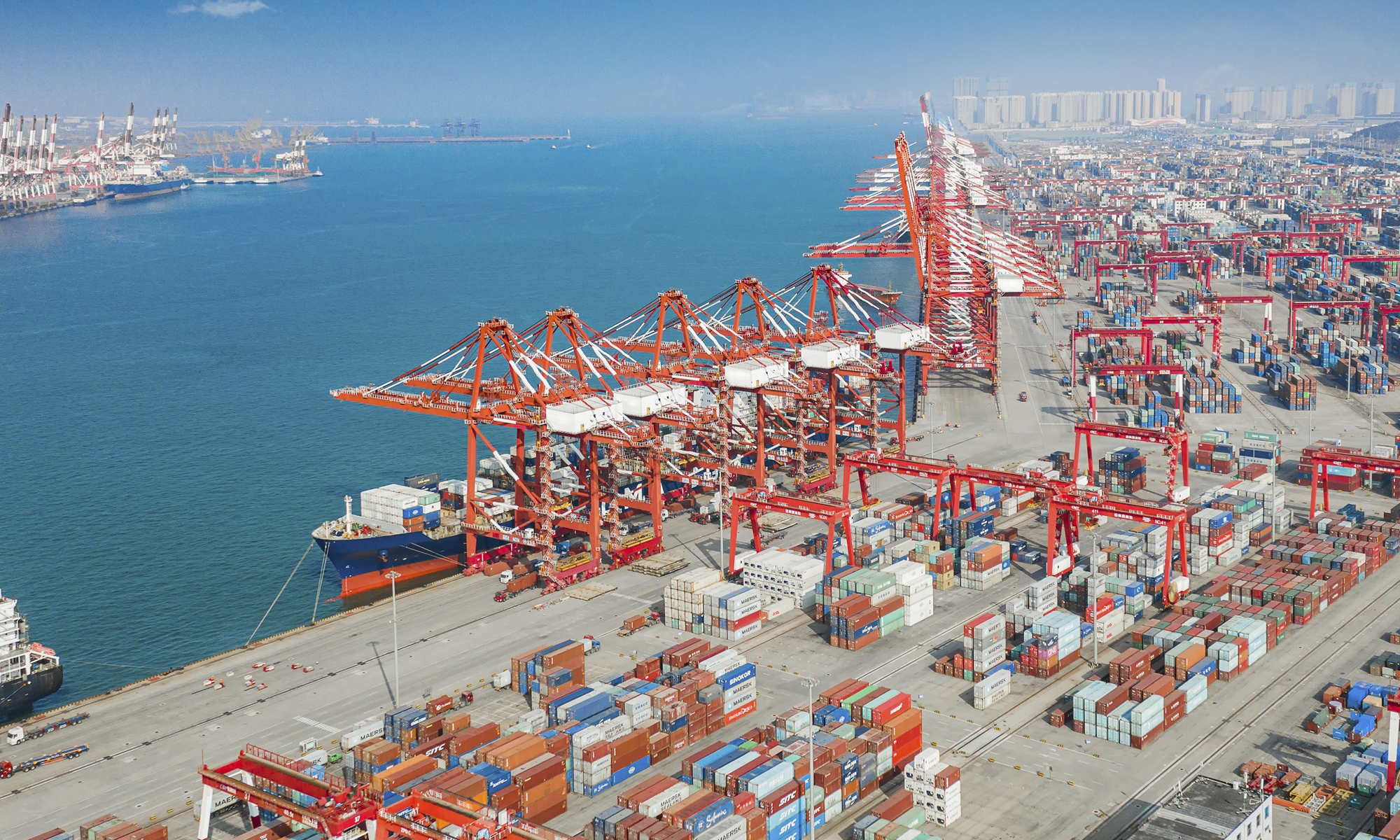
Aerial photo of container cargo terminal of Qianwan port in Qingdao, East China's Shandong Province Photo: IC
China's development model
Xi Jinping underscored the unique features of Chinese modernization at the opening of the congress on Sunday, which he said is the socialist modernization pursued under the leadership of the CPC.
"It contains elements that are common to the modernization processes of all countries, but it is more characterized by features that are unique to the Chinese context," Xi said.
Chinese modernization is the modernization of a huge population, of common prosperity for all, of material and cultural-ethical advancement, of harmony between humanity and nature and of peaceful development, Xi said.
Observers said that Xi made a comprehensive and in-depth systematic expounding of Chinese modernization in the report, forming a complete theoretical system that breaks the Western monopoly on modernization practice and theory.
Commenting on the Chinese modernization explained in the report, Martin Jacques, who was until recently a senior fellow at the Department of Politics and International Studies at Cambridge University, told the Global Times that the Western model of modernization was primarily driven by private interest and was unplanned, but China's modernization took place in the context of advanced Western countries. "This was the key role of the CPC. It had to be planned. We can see how extraordinarily successful it has been," Jacques said.
It offers two great lessons for developing countries. First, it showed how it was possible for a developing country to invent its own road to modernization. Second, the fact that China was successful meant that it could assist the developing countries in their modernization, he said.
Xu Bu, president of the China Institute of International Studies and secretary-general Xi Jinping Thought on Diplomacy Studies Center, told the Global Times that Chinese modernization is of great pioneering significance to global modernization, as it broke the "West-centered theory," provided a new choice for mankind to realize modernization and is a reflection and transcendence of the Western modernization.
Developing countries, most of which started late in development, should learn to "overtake around the curve," and Chinese modernization surpasses the Western model of monolithic and gradual development, Xu said.
Aside from its unprecedented and breathtaking speed, Ei Sun OH, a senior fellow at Singapore Institute of International Affairs and principal adviser of the Pacific Research Center of Malaysia, said Chinese modernization, as a carefully thought-out process, should also be able to avoid a lot of pitfalls associated with modernization, both from the West's road to modernization and from China's own reform and opening up, which include paying attention to environmental sustainability and avoiding blind development.
Xi unveiled the main objectives and tasks for the next five years in the report, which included make breakthroughs in promoting high-quality economic development, achieve greater self-reliance and strength in science and technology and make major progress in creating a new pattern of development and building a modernized economy.
Xi also expounded on China's overall development objectives for the year 2035, including substantially growing the per capita GDP to be on par with that of a mid-level developed country, significantly enhancing national soft power, steadily lowering carbon emissions after reaching a peak as well as comprehensively strengthening the national security system and capabilities.
International scholars and media outlets showed interests and anticipation to China's future development in technology and economy.
Bloomberg focused on China's future technology development, saying the report submitted to the 20th National Congress stressed the need for the nation to speed up technology self-reliance drive as the US aims to stop China from getting capabilities.
Jacques said the development objectives for the year 2035 is an important proposal, as it means China's per capita GDP would be on a par with many European countries.
"This is an exciting prospect because hitherto China has overwhelmingly belonged to the developing world. It would mean that China would be on the road to breaking down the distinction between developed and developing countries. It would mean that China was in a stronger position to shape the nature and norms of globalization and provide greater resources and more favorable terms for developing countries," he said.
Jeffrey Sachs, director of the Center for Sustainable Development at Columbia University, expects China to lead the world in innovation.
Sachs told the Global Times that "China will become a leader of innovation. I very much hope and count on China becoming a leader for innovation in sustainability."
According to him, the US model has unfortunately become dysfunctional in recent decades. It is turning inward and becoming protectionist even in business and investment, which is also unfortunate for America's long-term future and the rest of the world.
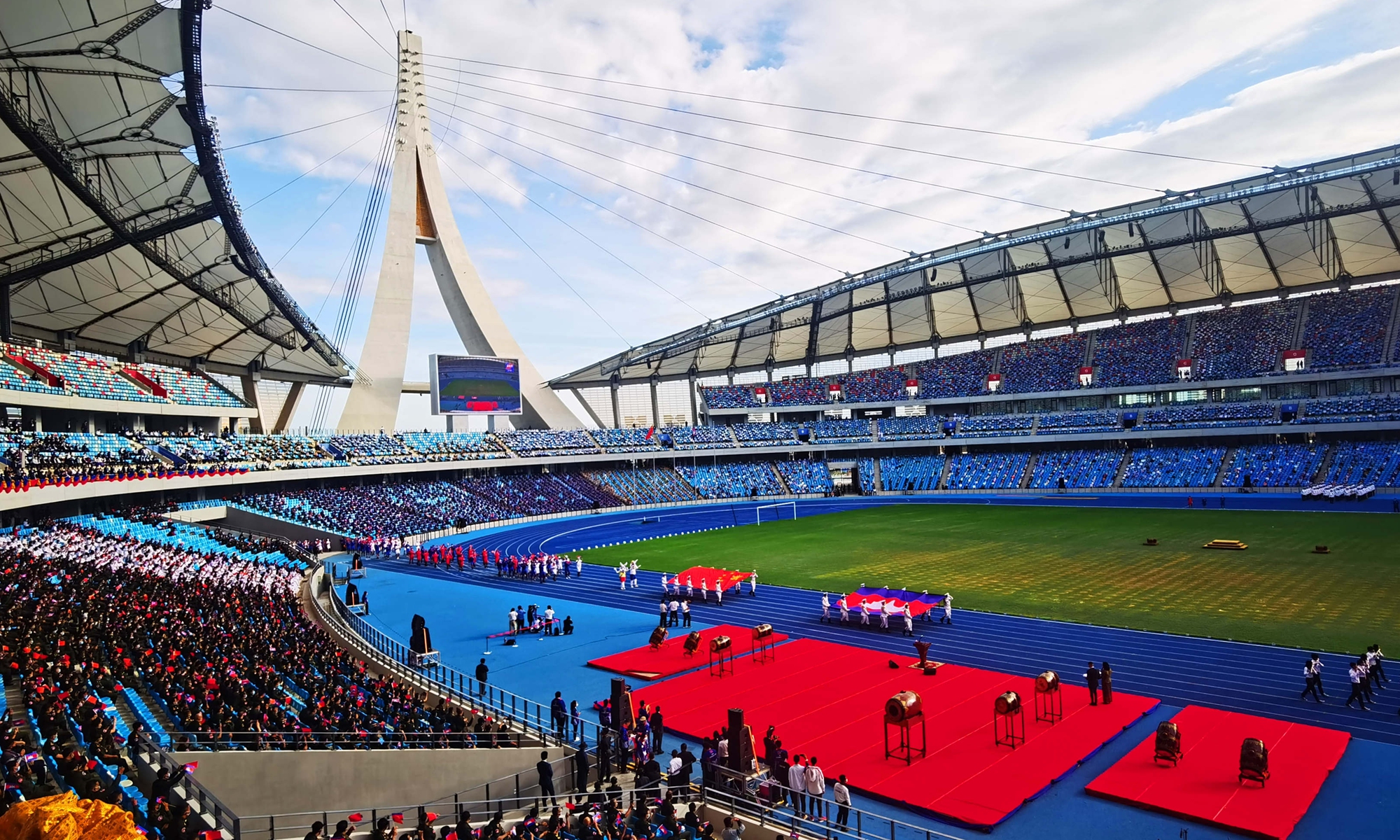
The Cambodian National Stadium built with China's help is officially opened in Phnom Penh on December 18, 2021. It is the largest stadium China helped build in a foreign country so far. Photo: VCG
CPC's critical role
International observers stressed that the leadership of the CPC, its people-centered approach and adjustment to the changing world guarantees China's development and offers the world a valuable experience in governance.
Mikhail Delyagin, deputy chairman of the Russian State Duma Committee on Economic Policy, told the Global Times that the CPC has been able to maintain its role as a source of development and stability because it constantly learns and maintains high internal competition while maintaining solidarity in the face of external forces.
"It was able to creatively adapt the Marxism of the 19th century and its experience of the 20th century to new requirements and implement eternal values with new methods. This is a very important and useful lesson for us," Delyagin said.
Delyagin said despite all the difficulties and problems, the CPC serves the people, not businesses, and therefore serves its country, and not global capitals which are indifferent to the fate of peoples and cultures. This is its main difference from the parties of the West.
Many international scholars highly value China's success in poverty alleviation, saying it showed that the CPC has always adhered to the people-centered philosophy that puts people first and it not only improved Chinese people's lives but offered tips for the majority of developing countries in tackling poverty.
The benefits of one-party leadership system are that policies that need long-term commitment have long-term commitment, and a classic example is the poverty alleviation campaign championed by Xi Jinping over the roughly eight years, Robert Lawrence Kuhn, an international corporate strategist, investment banker, and the chairman of The Kuhn Foundation, told the Global Times.
Heinz Dieterich, a world-renowned sociologist and political analyst from Germany who first proposed the concept of "21st century socialism," told the Global Times that he is confident that the Chinese model will be part of mankind's legacy, and "the essential lesson that we must learn from China's model is that a transformational responsible vanguard in power must maintain an active, open, honest dialectical interaction among the Party, the state and the social classes, in order to avoid harmful elitist interests to prevail in governance."
He said China is a mirror, in which the people of the world can see China is a living example that a state can serve the public interests, while the US is a living example of what you should not do in a democracy - neglecting the people's needs and only acting on behalf of the ruling elites.
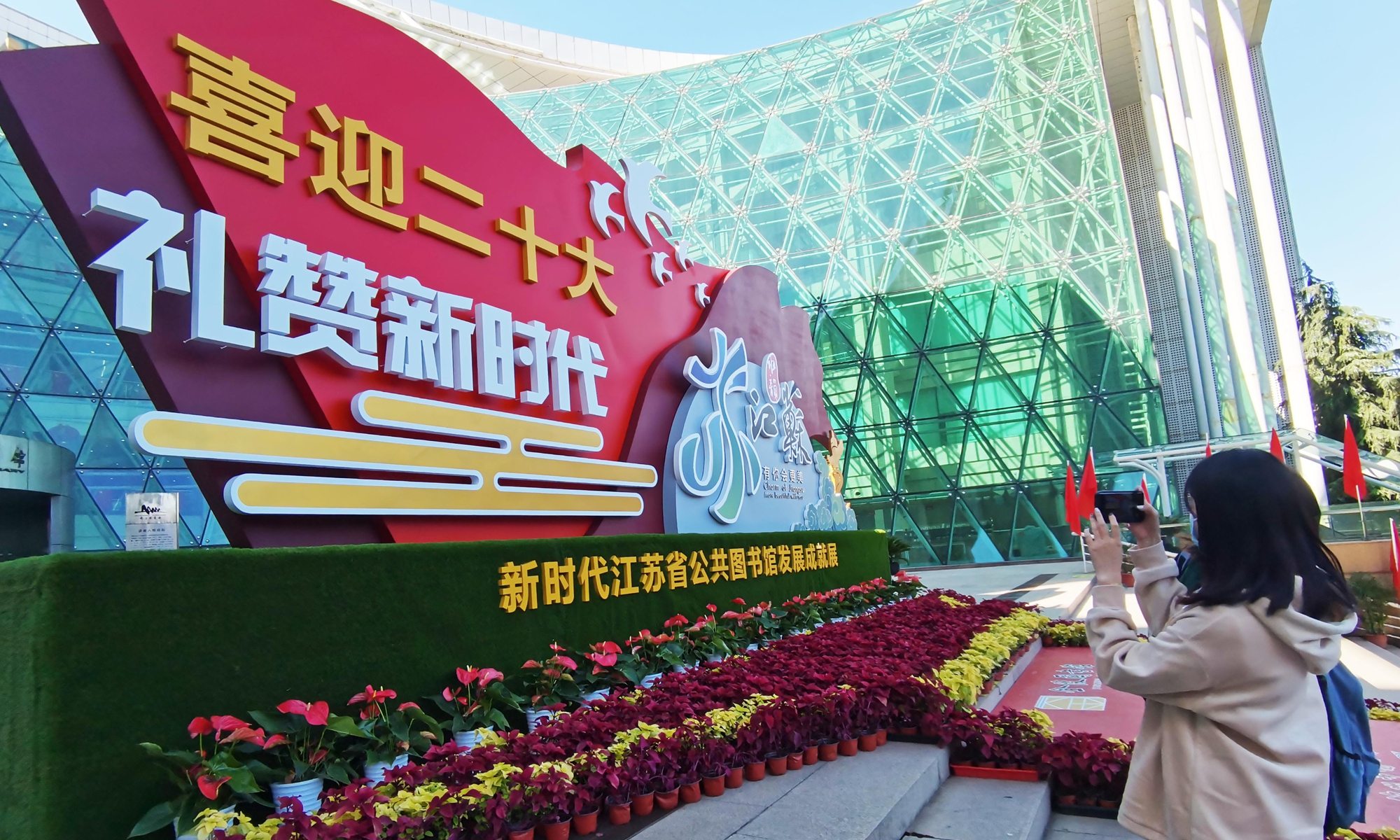
The exhibition of "Celebrating the 20th National Congress of the Communist Party of China - The Achievements in the New Era" is displayed at Nanjing Library in Jiangsu Province on October 18, 2022. Photo: VCG
Global governanceOne of the world's acute priorities is to improve global governance when the lingering COVID-19 pandemic, geopolitical conflicts, backlash against globalization are intertwining with each other and the deficits in peace, security, trust and governance are widening.
According to the report submitted to the 20th National Congress, China works to enhance coordination and positive interaction with other major countries to build relations featuring peaceful coexistence, overall stability and balanced development.
On various occasions in the past decade, Xi has called for real multilateralism and the UN-centered international system and also proposed the Global Development Initiative and Global Security Initiative.
Jacques said it's clear that with US' attempt to constrain and limit China's development that a new model of international relations is urgently needed. China, as it has grown stronger, has sought to show that there is and must be a different kind of global order that prioritizes peace and development.
He said the present international order is deeply undemocratic, dominated as it still is by the US and other Western countries, who represent only about 12 percent of the global population. A new kind of global order would place the emphasis on peace, development, equality, and democracy.
"Xi's thinking on international relations has injected a new kind of approach which has great appeal around the world and stands in sharp contrast to the anachronistic principles of the present system," he said.
Xu said that as the largest developing country in the world, China's development is deeply integrated with the rest of the world. China's diplomacy has actively assumed the mission and responsibility of being a responsible major country, which has won positive appreciation and warm response from most countries in the world, especially developing countries.
To realize the Chinese dream of national rejuvenation is closely connected with the dream of people around the world to pursue a better life, he said.
The essence of China's peaceful development is that China develops itself through maintaining world peace and its development also contributes to world peace.
"The path of peaceful development is a consistent state policy of China. This determination and will should not be underestimated, still less doubted," Xu said, noting that the "China threat" clamored by the West serves as a tool to contain China's development, which revealed the hegemony and power politics of the West.
Global geopolitics and the global economy have not been this unstable, inconsistent and unpredictable in generations, from the still-raging pandemic to the numerous conflicts on or across borders. Given such world volatility, China's stability, consistency and predictability, founded on the CPC as the ruling party can become geo-economic ballast, steadying a swaying world, Kuhn told the Global Times.